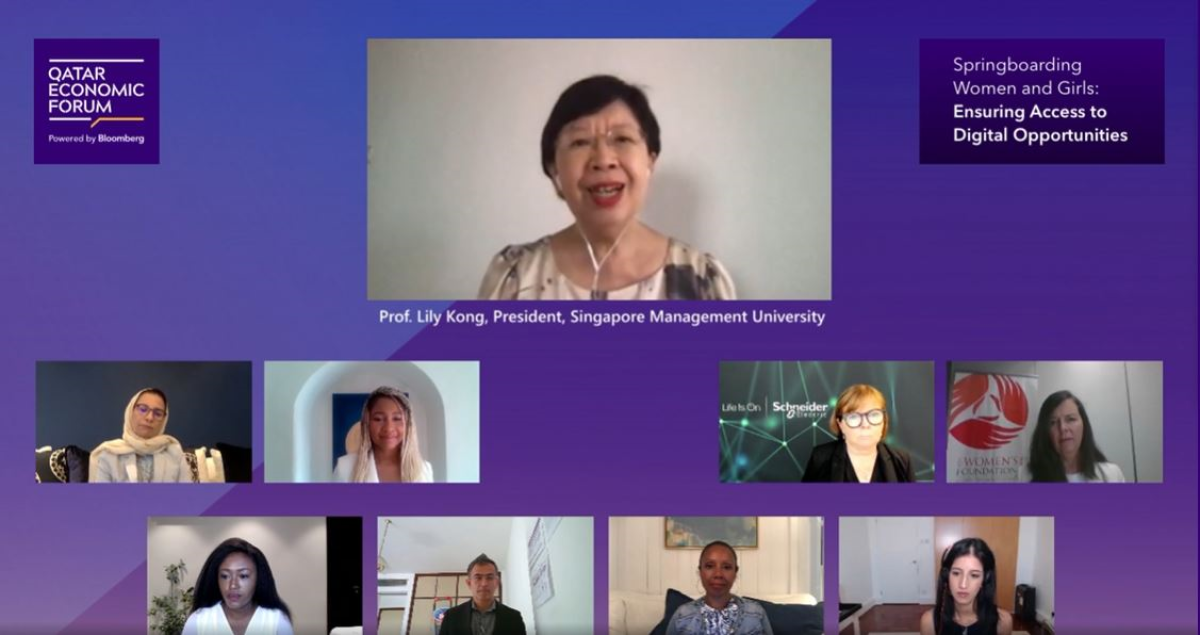
Should targets be set to ensure women are fully and fairly represented in Science, Technology, Engineering and Maths (STEM) education and careers? SMU President Professor Lily Kong gave a qualified, “Yes”. “We need to set targets without getting into affirmative-action. Women have to be there because of the abilities and what they can contribute. If we can recognise what they could contribute, we would naturally give them the space,” she said.
This was just one of the questions she addressed as panellist at the Qatar Economic Forum (QEF), which featured the participation of more than 100 speakers – including heads of states, chief executives, inspirational figures and decision-makers – in addition to a global delegation of more than 2,000 people from around the world.
The international event sought to discuss the visions and trends supporting the growth of the global economy during the post-coronavirus pandemic; and to rethink the prospects for the global economy.
Among the most prominent leaders who spoke at the virtual forum were South African President Cyril Ramaphosa, Rwandan President Paul Kagame, Armenian President Armen Sarkissian, Turkish President Recep Tayyip Erdogan; Democratic Republic of the Congo President Felix Tshisekedi, Bangladesh Prime Minister Sheikh Hasina Wazed, UK Prime Minister Boris Johnson, Cote d'Ivoire Prime Minister Patrick Achi, and Senegalese President Macky Sall.
The QEF focused on six main pillars over three days: "Technology Advanced" took a closer look at permanent changes to the human-technology nexus; "A Sustainable World" explored the intersection of capitalism and climate; "Markets and Investing" posed the question of whether investors, in their inexorable pursuit of growth opportunities, can shape a more resilient global economy; "Power and Trade Flows" gathered global power brokers to share their vision of the road ahead; "The Changing Consumer" examined the future of commerce; and "A More Inclusive World" offered ideas for healing fissures in a post-pandemic society.
Roundtable discussions were held throughout the Forum on topics including sports, cryptocurrencies, renewables, sustainability, financial markets, education, healthcare, and more. Panellists included CEOs, C-suite executives, government leaders, journalists, experts and influencers.
Prof Kong participated in a roundtable which discussed education and the “digital gender gap” – the inequalities between men and women in terms of digital technology access and use. Her distinguished fellow panellists were:
· H.E. Dr. Sheikha Abdulla al-Misnad, Former President of Qatar University; Prime Minister's Office, Qatar
· June Angelides MBE, Investor, Samos Investments
· Deirdre Murphy, SVP, HR – Industrial Automation, Schneider Electric
· Fiona Nott, Chief Executive Officer, The Women's Foundation
· Izzy Obeng, Managing Director, Foundervine
· Tejas Patel, Managing Director – Lead, Technology Strategy & Advisory, Growth Markets, Accenture
· Kahina Van Dyke, Global Head of Digital Channels & Data Analytics, Standard Chartered Bank
They explored how, as we enter an era of unprecedented digital transformation and innovation, addressing the digital gender divide is critical to developing a global empowered workforce. Women and girls around the world often lack access to digital resources because of the high cost of Internet access and the lack of educational content in local languages.
Bloomberg columnist Anjani Trivedi, who moderated the session, questioned how can we foster the next generation of women tech CEOs and digitally-equipped local leaders? As the female workforce continues to be a central driver of future economic growth, what successes have been achieved in lessening the digital gender gap and what future innovations in education can further reduce it?
Ms Trivedi asked Prof Kong how education can help women and girls gain equal access to digital technology. Prof Kong explained that in terms of access to and utilization of technology the digital gender divide in Singapore and some other parts of Southeast Asia is actually not that stark.
“But where it is stark and the divide still remains,” said Prof Kong “is actually in terms of young girls and women going into STEM education”. She described the “leaky pipeline” of declining numbers of girls in STEM as they move from school, to university and still higher education. “So what you get is a lack of role models, you get a lack of research and writing by women, and that has knock-on effects. So we absolutely need to address this through education by building the pipeline in education, or it will never flow through into community and society.”
She argued that the best way to address social divisions is through both macro policy as well as micro practices. “Whether it's a gender, age, wage gap or whether it's maternity leave and paternity leave or expert representation at the macro level, it's absolutely necessary for governments and corporates to take leadership and to take a position, holding ourselves up to certain standards, putting in place policies and actually effecting those policies. Even while we have broad directions, policies and so forth, at the end of the day it comes down to the everyday micro practices.”